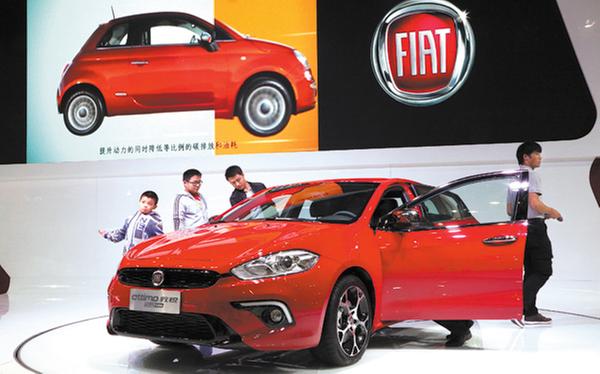Fiat Chrysler takeover mystery: A trick, a treat or a strategy?
 |
| Visitors look at a Fiat model at a car expo in Zhengzhou, capital city of Henan province. GENG GUOQING / FOR CHINA DAILY |
Chinese automakers are advised to exercise caution in overseas mergers and acquisitions
If you can't beat them, buy them. This is what Chinese automakers are recently rumored to be doing, as Fiat Chrysler Automobiles is looking for a merger.
Citing unnamed sources, the United States-based website Automotive News reported last week that FCA had rejected a Chinese offer as it was too low.
Soon Geely and Dongfeng denied any plans to buy FCA. So did GAC Group, which, some argue, would have been the most likely purchaser, as it already has a joint venture with the Italian-US carmaker.
With people left wondering who the potential buyer could be, another more important question has cropped up: what drove the Chinese into trying to buy it in the first place?
The words of Gui Shengyue, Geely's executive director, might be suggestive of some people's logic. "It could be a fast track for their development," he said after denying Geely's interest in FCA.
Gui is qualified to say that, as Geely has been benefiting significantly in terms of technology and design from its 2010 takeover of Swedish marque Volvo.
It is logical that some automakers are envious of these successes and want to follow suit, expecting it will bear similar fruit.
FCA has the trappings: it is large, with 15 brands, including Jeep, Dodge and Alfa Romeo, in addition to the two in its name: Fiat and Chrysler. It is reported to have some 160 production facilities and more than 80 research centers worldwide.
However, a closer look will show that its takeover is unlikely to generate the same results at the Geely-Volvo example.
One aspect is that FCA is lagging behind in research and development.
Wu Yingqiu, a senior automotive industry observer, said FCA's R&D expense equates to merely 1 percent of its revenue.
The average figure stands at around 6 percent in the industry.
The company has made little efforts in terms of new technological trends such as electrified powertrains. FCA did announce recently plans to join BMW to work on autonomous driving, but most automakers began that work years ago.
So Wu warned Chinese automakers should be cautious and prevent impulsive purchases.
"We should assess the situations, take more into account and ask more whys."
Another difference is that FCA has not made up its mind about the business composition.
CEO Sergio Marchionne has long called for mergers as a way of sharing the costs of making cars, but he has failed so far to find a partner among the company's bigger rivals.
Volkswagen and GM have both said they are not interested in talks with FCA.
But last month, he said the company would evaluate whether to separate from some of its businesses as part of a strategic plan he will unveil in early 2018, his last major project for the carmaker before he plans to retire the following year.
Alfred Tian, an independent car analyst in Beijing, said it would be unlikely for any of the rumored buyers to devour FCA as a whole, which is much larger than them in sales or revenue.
Statistics show that FCA sold 2.36 million cars in the first half of the year. In contrast, Dongfeng, the largest of rumored buyers, sold 1.47 million units in the period.
Geely's sales goal for this whole year is 1.1 million units.
Some others suggest that the issue should not be taken seriously, saying that the takeover hype might be nothing but FCA's trick to boost its market value to get a better deal some day.
According to Reuters, in the two days since the rumors emerged, FCA's valuation had jumped more than 10 percent to a 19-year high.
On Aug 15, Morgan Stanley raised the value of FCA's Jeep SUV division to 14.7 euros ($17.28) per share, about 38 percent of the company's 10.62-euro closing price in Milan, Italy, one day earlier.

